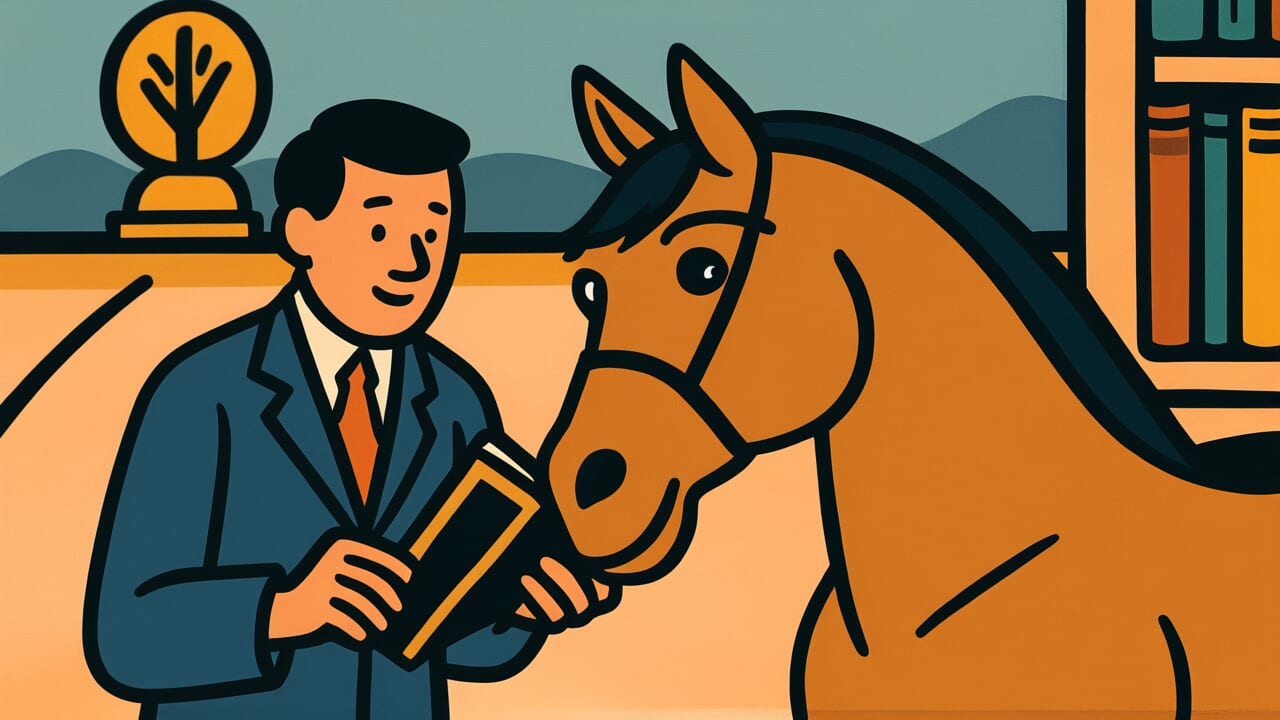How to Read “Those who control horses by the book do not bring out the horse’s true nature”
Sho wo motte gyo wo nasu mono wa uma no jō wo tsukusazu
Meaning of “Those who control horses by the book do not bring out the horse’s true nature”
This proverb means that people who rely only on theory and knowledge cannot truly understand the essence of what they’re working with.
If you try to control a horse using only what you learned from books, you won’t deeply understand the horse’s real feelings or nature.
This teaching applies to all practical fields, not just handling horses. Imagine someone who only read a manual before going to work.
They struggle when facing actual situations. A big gap exists between theory and practice.
True understanding comes only through experience.
People use this proverb to warn against relying too heavily on book knowledge. Even today, it describes people who passed certification exams but lack practical experience.
It also applies to those who know theory perfectly but lack field sense. This timeless truth teaches that real understanding requires both knowledge and experience.
Origin and Etymology
This proverb likely comes from the ancient Chinese text “Han Feizi.” This book represents Legalist philosophy and was written around the 3rd century BCE.
It contains a passage discussing how to control horses.
“Gyo” means controlling horses. In ancient times, the skill of skillfully handling horses was extremely important.
Controlling war chariots on battlefields and handling horses for transportation were highly valued practical skills.
This proverb teaches that those who try to control horses using only written theory can never truly understand a horse’s real feelings or nature.
Horses are living creatures. They have moods, physical conditions, and individual differences that vary from moment to moment.
Books contain general methods, but you cannot know what the horse in front of you feels or needs without actually interacting with it and gaining experience.
Ancient China strongly valued practical learning. Legalist philosophy especially emphasized practice over theory and reality over abstract ideas.
This proverb was born from that philosophical background. It later spread to Japan and became widely used.
Usage Examples
- He only reads business management books, but “those who control horses by the book do not bring out the horse’s true nature”—he struggles with actual store operations
- Even if you memorize programming textbooks perfectly, “those who control horses by the book do not bring out the horse’s true nature,” so it’s important to actually write code first
Universal Wisdom
The universal truth this proverb speaks about is the essential difference between knowledge and experience.
Since ancient times, humans have had two ways of understanding things: “learning” and “experiencing.” However, these two are never the same thing.
Why is theory alone insufficient? Because living subjects have countless variables and subtle elements that cannot be put into manuals.
A horse as a living creature has different moods each day and different personalities for each individual.
Wind strength, surrounding sounds, the rider’s tension—everything affects how the horse reacts. Such complex reality cannot be written in words.
Humans have two ways of knowing: understanding with the head and understanding with the body.
No matter how detailed the explanation of riding a bicycle, you won’t understand the feeling of balancing without actually riding.
Even if you memorize a cooking recipe, you can’t master subtle heat adjustments without making the dish many times.
This proverb has been passed down for so long because humans have constantly faced the difference between “knowing something” and “being able to do something.”
Knowledge is only a starting point. True understanding comes only through facing the subject, repeating failures, and sharpening your senses.
When AI Hears This
Control engineering divides methods of operating systems into two main types: open-loop control and closed-loop control.
Open-loop operates only on the prediction “if I do this, this should happen.” Closed-loop adjusts while watching the subject’s response.
Trying to control a horse according to a manual is typical open-loop control. Even if it says “pull the reins 3 centimeters to turn right,” the actual horse might be tired or excited.
The road surface might be slippery, or the wind might be strong. These variables are infinite.
Even modern self-driving technology considers complete open-loop control impossible. Sensors must constantly check the surroundings.
On the other hand, skilled riders read the horse’s state from ear movements, muscle tension, and breathing rhythm, instantly adjusting their actions.
This is high-speed closed-loop control receiving feedback dozens of times per second.
Control theory mathematically proves that as feedback speed and accuracy increase, you can stably control more complex subjects.
What’s interesting is that when two intelligent systems—human and horse—interact, feedback becomes bidirectional.
The horse also senses the rider’s minute movements and responds. This is exactly the “human-collaborative control” that modern robotics aims for.
Ancient people grasped this essence without equations.
Lessons for Today
What this proverb teaches you today is the importance of balancing learning and practice.
In our information-rich modern society, gaining knowledge has become much easier than before. Search the internet and you can find know-how in any field.
But precisely because of this, we tend to lose sight of the difference between “knowing” and “being able to do.”
When starting something new, do you try to prepare perfectly before taking action? Of course basic knowledge matters, but once you’ve learned to some extent, you need to boldly jump into practice.
Don’t fear failure. Take that small first step.
Real learning happens within practice. Experiences that don’t go well, unexpected events, and insights gained from them—these are what make you grow.
Books are like maps. Just staring at a map won’t tell you the atmosphere of that land, the smell of the wind, or the ups and downs of the road.
Only by actually walking there does true understanding emerge.
With both wings of knowledge and experience, move forward on your own path.



Comments